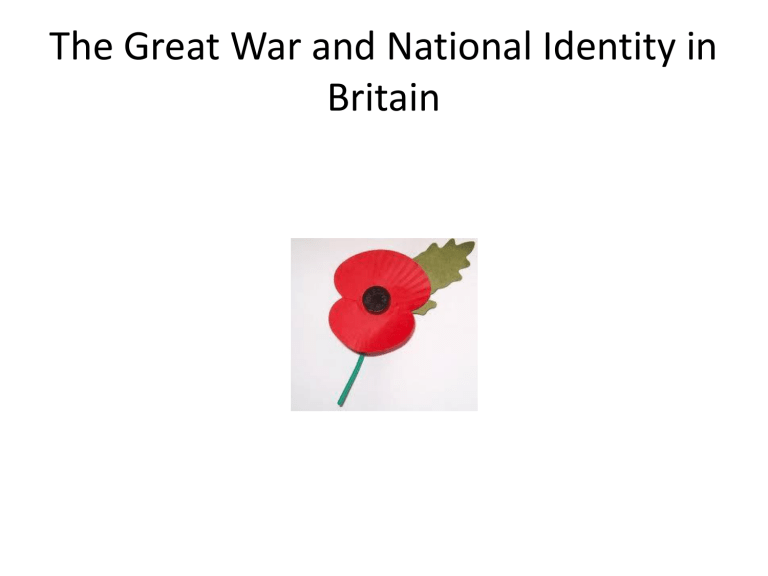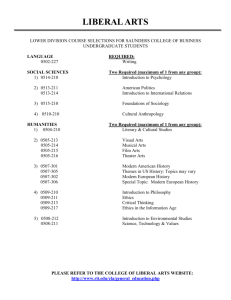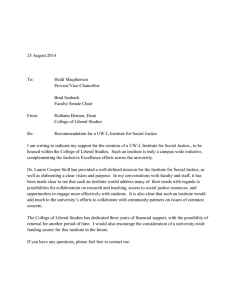The Great War and National Identity in Britain

The Great War and National Identity in
Britain
Ongoing legacy
• Culture of
Remembrance
• Politics of the poppy
• Last veterans (Harry
Patch 1898-2009)
• New meanings in context of new wars
• 1914-18 anniversaries
(eg Ireland)
Four narratives/questions on the relation between WWI and nation
• 1. Common experience in the making of the nation? (social history)
• 2. From jingoism to Little Englandism?
(cultural history)
• 3. The persistence of Liberal England?
(politics/economics)
• 4. Ongoing legacy/rewriting of the war/interplay of myth and memory
1. Common experience in making of the nation?
• Unprecedented level of volunteering and then conscription (5m total)
• Mobilisation of home front in support of the war
• Unprecedented state role in economy
• Symbol of women in munitions factories (and arguments about consequent enfranchisement 1918)
Bringing peoples together?
• Unites classes in trenches
• Breaks down localism
• Brings Empire together (new emphasis on a war beyond the
Western Front)
• 4 nations involvement, including
200,000 Irish
• State role eg in separation allowances another step towards welfare state
• Shared experience of loss; common symbols of monuments and memorials; national ‘sites of memory’ (Pierre Nora): national and local
Or exposes divisions?
• The ANZAC experience an important symbol for developing nationalism of eg Australia
• Mobilisation of economy strengthens position of organised working class and erodes divisions within
(1917: 5.5m days lost due to strikes; 1918: 6m;
Germany less than 2m both years)
• Divisions over meaning of loss between survivors, bereaved, and state (dominance of elite even at local level)
• Loss as source of division eg North vs South Ireland; and Protestant vs Catholic – cf bombing of Enniskillen,
1987
2. From jingoism to little Englandism?
• Contrast between the
‘rush to colours’ of autumn 1914, preconceptions of chivalry and heroism, a war to be over by
Christmas, and the story of the horrors of industrialised trench warfare. Aug/Sept 1914,
750,000 volunteers
Realities of war
• War descends into stalemate of trench warfare and mud …
• 750,000 deaths
• 1 in 6 families lose a member
• 1 in 3 households have a man killed, injured or taken prisoner
The voice of the war poets
• Idea of voice of authenticity
• Critical of high command
• Critical of home front
• Emphasis on suffering
• Siegfried Sassoon
• Wilfred Owen (dies last week of war)
• ‘the pity of war’
Gender relations
• Unsettling of martial/heroic masculine values
• Feeling of being coerced by home front pressure and expectation (white feathers)
• War-time work of women
• Gaining of vote by women 1918
• Symbol of shell-shock soldier
Little Englandism?
• Decline jingoism
• Attractions of home
(rather than imperial/martial adventure); and of
English countryside
• Inward-looking
• Reluctance to go to war again – culture for appeasement
3. The Strange Persistence of Liberal
England?
• George Dangerfield, The
Strange Death of Liberal
England (1935)
• Arno Mayer, The
Persistence of the Old
Regime (1981)
The Strange Death of Liberal England
• Focus on pre-war triple crisis of suffragettes; syndicalist strikes; and Irish nationalism
• Collapse saved by war
• But war also sees loss of liberal
England: collapse of Liberal party; policy of conscription; state interventionism; militarism; harsh peace
• Post-war realignment of politics: decline of Liberals; class politics of (working-class Labour) vs
Conservatives; interwar era of strikes, discord, and economic crisis (written from perspective of this moment)
Persistence of the old regime
• Focus more on continental
Europe
• Points to ways in which old order able to cling on despite destabilisation of WWI; middleclass divided; old order willing to embrace violence in WWI and interwar: ‘The forces of the old order were sufficiently willful and powerful to resist and slow down the course of history, if necessary by recourse to violence’.
• Where does Britain fit in? Value of setting Britain in international/comparative perspective (weakness of British historiography)
Decline of Liberal England over-stated
• Suffragette movement dissipates; turns of patriotism
(journal takes on title ‘Dreadnought’); vote won 1918, but on conservative basis (over 30); interwar decline feminism
• Working-class do grow in strength, but support war
(patriots); and post-war reject sectional voting (importance of a working-class Conservative vote)
• Ireland does descend into violence in War of Independence
1919-22, and Civil War 1922-3. But partition and creation of
Irish Free State temporarily settles 4 nations problem.
North of Ireland becomes outlier in continuing the
British/Protestant identity of 19 th Century nation
• Britain no revolutionary post-war situation: importance of victory; veterans do not become disaffected political group
Persistence of old regime?
• Unique in Europe for persistence of ruling monarchy and a 19 th conservative party
• But this hides change (overstates persistence)
• Aristocracy hit by high rate of death WW1 and loss of land in Ireland
(David Cannadine, The Decline and Fall of the British Aristocracy)
• Economic damage of war (and struggle of international economy interwar): middle-class anxieties about inflation and spending; trade unionism and wage bargaining; strengthening of class interests; politics of the public vs sectionalism
• Question of why this does not lead to more violent clashes; legacy of war and its rhetoric of common sacrifice/national values, and its cultural impact – feminisation of the nation/turning inwards/turn to home and security; a politics of moderation, home economics, welfare (emergence of welfare state in response to interwar unemployment)? ie remaking of the nation in response to war?
4. Ongoing legacy/rewriting of the war/myth and memory
• Revisionism critiques the ‘pity of war’ portayal: a war vs tyranny and aggression that needed to be fought; a war in which lessons gradually were learnt; a war that had ongoing (remarkable) support
– the war poets not the authentic voice.
• Coming to fore of war literature in 1930s (culture of appeasement and context of another possible war); and again in 1960s in context of Vietnam; also role of generations – importance of oral history of ordinary men vs generals in BBC Great War series of 1964; and then of last veterans in flowering of memory in 1990s (Regeneration;
Bird Song …)
• Representations contribute to a sense of who we are: ongoing power of anti-war narrative in liberal understandings of nation
• Shift as we reach beyond living memory? (NB shift in implications of revisionist historiography in context of new appeasement style debates regarding ‘war on terror’ and intervention in Iraq)

